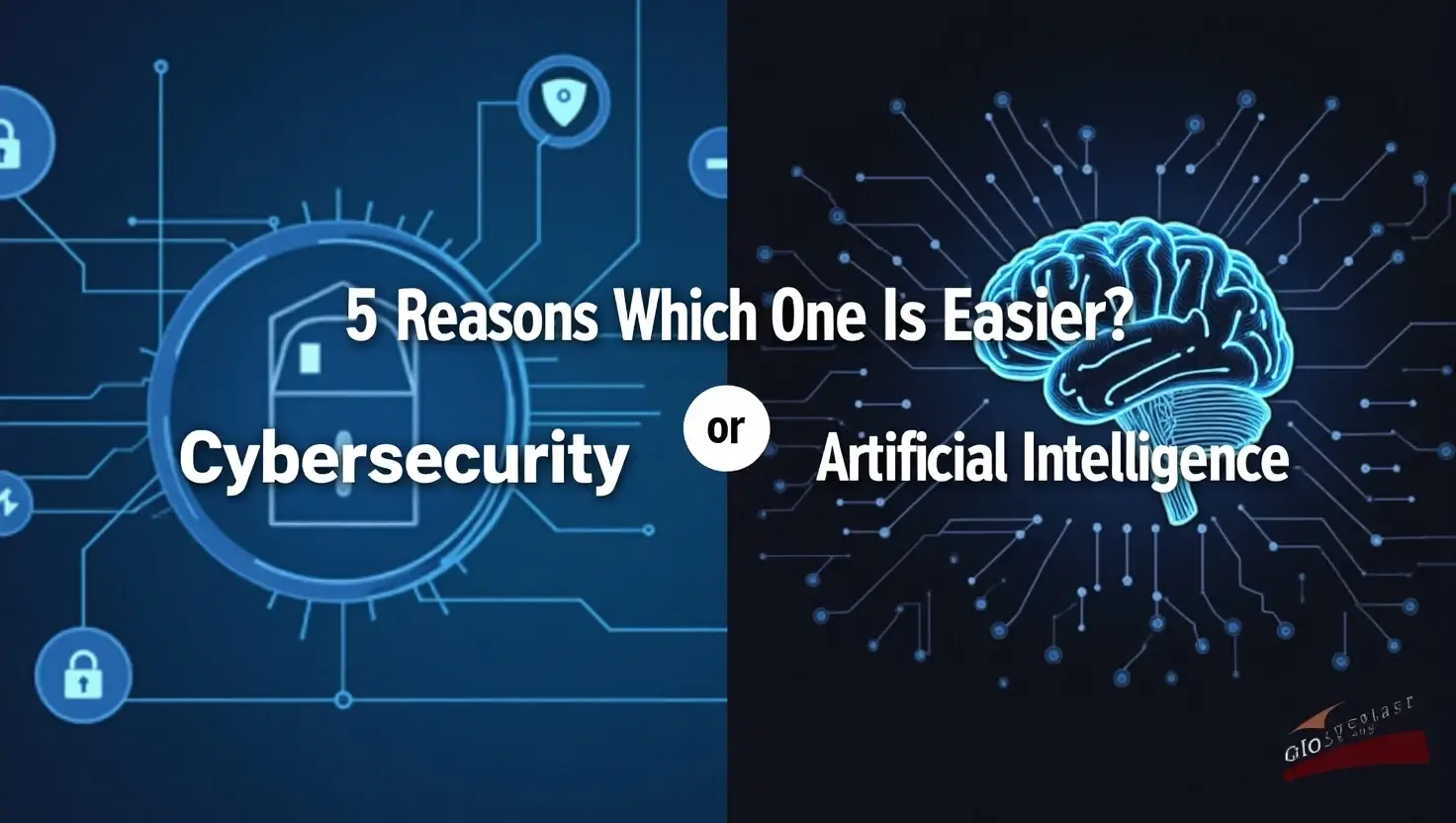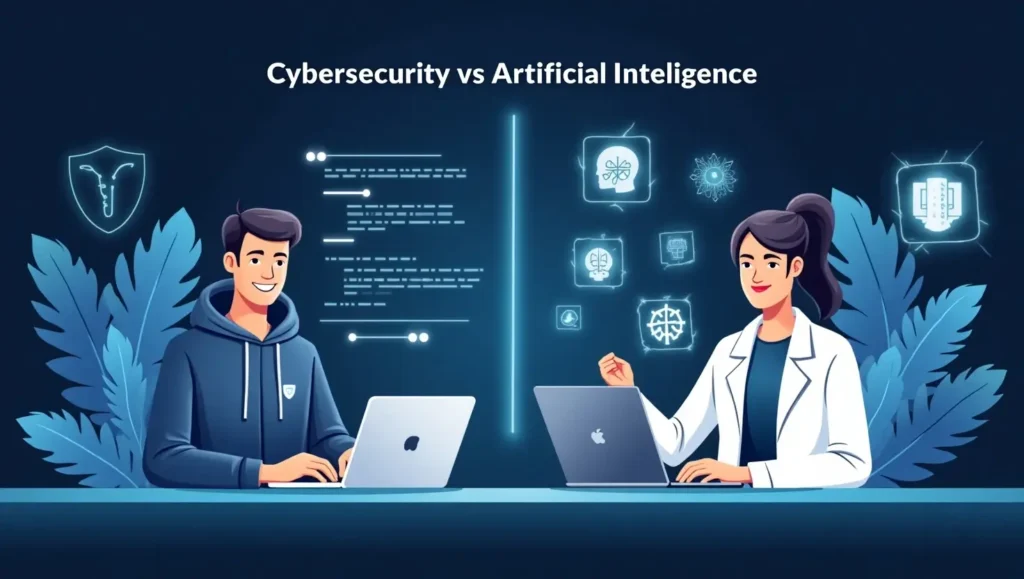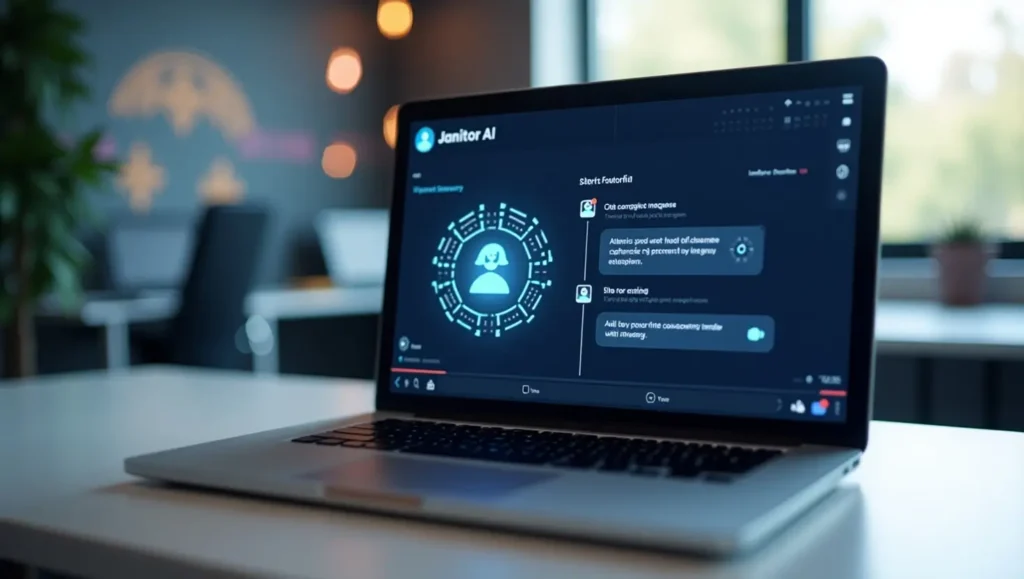Did you know that over 60% of tech learners on LinkedIn choose the wrong starting point for their career path, leading to frustration, burnout, and wasted months?
As the tech industry continues its explosive growth, two career giants—cybersecurity and artificial intelligence (AI)—are consistently at the top of trending job searches. But here’s the million-dollar question: Which is easier—cybersecurity or artificial intelligence?
If you’re a career switcher, college student, or IT pro looking to level up, you’ve probably been stuck in this same mental tug-of-war. On one side, cybersecurity promises job security and quick entry. On the other, AI flaunts future-proof appeal and high salary potential. But which one offers a smoother, faster, and more accessible ride to tech success?
Before we dive in, let’s define what “easy” really means in this context. We’re talking about:
- How hard the learning curve is
- How accessible the resources are
- How quickly you can land a job
- What you get paid for the effort
- And how relevant the work is in day-to-day life
In this blog, we’ll break down these five factors to help you make an informed, strategic decision. Whether you’re trying to decode the job market or looking to avoid costly detours, this comparison will guide you in choosing the right path—with less confusion and more confidence.
What Makes a Tech Career “Easy”?
Let’s face it—“easy” is subjective. But when it comes to starting a career in tech, certain factors can make one path feel far more manageable than another. To level the playing field, we’ve identified five universal pillars that define what makes a tech career “easy” to start and sustain:
The 5 Pillars of Ease in Tech Careers:
| Pillar | What It Means |
| Learning Difficulty | How complex are the topics for a beginner? |
| Resource Accessibility | Are affordable/free resources widely available? |
| Entry-Level Job Paths | Can you get a job without years of experience or a degree? |
| Salary vs. Effort | Is the compensation worth the time and energy invested? |
| Real-Life Relevance | How often are the skills used in real-world situations? |
By evaluating both cybersecurity and artificial intelligence using these exact standards, we can compare apples to apples—not apples to rockets. This gives you a clear, unbiased picture of which is easy: cybersecurity or artificial intelligence, based on what matters most to real learners and job seekers like you.
5 Reasons which One Is Easier? Cybersecurity or Artificial Intelligence

Reason #1 – Learning Curve
When you think about diving into tech, the first roadblock is usually the learning curve. So let’s answer the big question: Is cyber security easy or hard? And is an artificial intelligence course easy or hard?
Cybersecurity: Beginner-Friendly & Hands-On
Cybersecurity has become one of the most accessible tech careers—you don’t need a college degree to get started. Many professionals come from completely unrelated fields, including retail, healthcare, and even military service.
You’ll begin with core concepts like:
- Networking basics
- Operating system vulnerabilities
- Security protocols and risk management
Certifications like CompTIA Security+, CEH (Certified Ethical Hacker), and Google Cybersecurity Certificate are designed for beginners, with minimal prerequisites. These credentials not only teach you the ropes—they’re also recognized by employers across the U.S.
Real-life proof?
Check Reddit threads like r/cybersecurity and LinkedIn stories from people who went from barista to security analyst in under 12 months by focusing on hands-on labs and certifications. It’s not easy—but it’s learnable and structured.
Artificial Intelligence: A Tougher Climb
Now flip the coin. Is artificial intelligence course easy or hard? AI, while exciting and future-focused, has a steeper learning curve. You’ll need a strong grasp of:
- Linear algebra
- Calculus and statistics
- Programming in Python and libraries like TensorFlow or PyTorch
Most successful AI professionals have a computer science, data science, or engineering background, or they’ve spent months—even years—self-learning from academic-level courses.
A post from a self-taught AI developer on LinkedIn sums it up:
“The hardest part wasn’t learning Python—it was understanding the math behind neural networks. That’s what slowed me down.”
Verdict:
If you’re looking for the path of least resistance with quick wins and structured growth, cybersecurity clearly offers a smoother and more approachable learning curve than AI.
Reason #2 – Resources & Cost of Learning
Learning a new skill doesn’t just take time—it costs money. But some paths are way more wallet-friendly than others. So how do cybersecurity and AI compare in terms of resources and cost?
Cybersecurity: Affordable & Abundant
One of cybersecurity’s biggest perks is how easy it is to get started without breaking the bank. You’ll find thousands of beginner resources—many of them free or low-cost:
- TryHackMe and Hack The Box: Interactive, gamified platforms
- Cybrary and YouTube: Free structured video courses
- Bootcamps: Intensive programs ranging from $1K to $5K
What’s more, cybersecurity education follows a “certification stack” model. You earn one cert (like Security+), get a job, then level up with more specialized training. It’s pay-as-you-grow—a strategy many beginners use to avoid student debt.
AI: High Cost, High Complexity
Learning AI, on the other hand, often feels like enrolling in a part-time college program.
Despite the availability of AI and machine learning courses on sites such as Coursera, edX, and Udacity, many:
- Require advanced math knowledge
- Include university-level assignments
- Cost $300–$2,000 for completion certificates
While you can find free AI tutorials, they typically assume you already know Python, calculus, and statistical modeling. This adds a hidden cost: you have to backtrack and master the basics first.
Community & Mentorship Access
Cybersecurity wins again here. Its online community is massive—Discord channels, subreddits, GitHub repos, and mentorship groups are readily available. AI groups exist too, but often skew academic or professional, which can intimidate newcomers.
Verdict:
Cybersecurity is far more accessible, both financially and educationally. If you’re budget-conscious or self-teaching, it offers more open doors and fewer gatekeepers.
Reason #3 – Entry-Level Jobs & Career Accessibility
If you’re looking to break into tech quickly, the availability of entry-level roles is a game-changer. So, which field—cybersecurity or AI—gets you hired faster?
Cybersecurity: A Shortcut to Employment
Cybersecurity continues to experience a massive talent shortage, with over 570,000 unfilled cybersecurity jobs in the U.S. alone, according to CyberSeek.
Entry-level roles include:
- SOC Analyst (Security Operations Center)
- Junior Penetration Tester
- GRC (Governance, Risk & Compliance) Associate
Most job listings on platforms like ZipRecruiter and Indeed ask for:
- CompTIA Security+ or equivalent
- Hands-on experience with basic tools
- A passion for cybersecurity—not necessarily a degree
Many roles offer on-the-job training and fast-track hiring cycles, especially in industries like healthcare, finance, and government.
AI: Rewarding but Harder to Access
While the salaries in AI are lucrative (we’ll get to that next), the barrier to entry is much higher.
Common roles:
- Data Scientist
- Machine Learning Engineer
- AI Research Assistant
These often require:
- A strong portfolio of projects (GitHub, Kaggle, etc.)
- Internship experience
- A bachelor’s or master’s degree in computer science or data science
AI job openings are competitive and favor candidates with academic research or published work. Hiring cycles are longer, and breaking in can feel like pushing through a locked door.
Verdict:
Cybersecurity leads in career accessibility. If you want a job within 6–12 months, it’s the better bet. But if you can afford the long runway, AI may pay more in the long run—which brings us to…
Reason #4 – Salary vs. Accessibility
Let’s talk numbers—because at the end of the day, ROI (Return on Investment) matters. So… which pays more, cyber security or AI? And how does that match up with the effort it takes to break in?
Cybersecurity Salaries: High Pay, Low Barrier
According to Glassdoor, the average U.S. cybersecurity salary is:
- Entry-Level (SOC Analyst, Jr. Pentester): $70,000–$85,000
- Mid-Level (Security Engineer, GRC Consultant): $100,000–$130,000
- Senior-Level (CISO, Security Architect): $150,000+
Cybersecurity professionals are essential in every industry—from hospitals to banks to retail. That means stable employment and multiple pathways to grow.
AI Salaries: Sky-High, But Selective
Now here’s where AI flexes its financial muscle. Per Levels.fyi and Indeed:
- Entry-Level (ML Intern, Jr. Data Scientist): $90,000–$110,000
- Mid-Level (ML Engineer, NLP Developer): $120,000–$160,000
- Senior-Level (AI Researcher, Lead ML Scientist): $180,000–$250,000+
Sounds great, right? The catch: You need years of education, advanced projects, and elite-level math skills to reach the higher tiers. It’s a steeper climb—both in time and technical mastery.
| Role Type | Field | Avg Entry Salary | Barrier to Entry | ROI Speed |
| SOC Analyst | Cybersecurity | $75,000 | Low (cert-based) | 6–12 months |
| Data Scientist | AI | $100,000 | High (degree+proj) | 18–36 months |
Verdict:
AI pays more—but only after a long and expensive path. Cybersecurity offers a more immediate payoff, especially for career switchers and self-taught learners.
Reason #5 – Real-World Use & Future Stability
Finally, let’s address longevity. You’re not just picking a job—you’re choosing a future-proof skill set. So, which is better to learn—AI or cyber security?
Cybersecurity: Ubiquitous & Evergreen
Cybersecurity isn’t a trend—it’s a necessity. With ransomware attacks up 95% since 2020, every business, big or small, is investing in digital protection.
Real-world applications:
- Securing medical devices
- Monitoring financial fraud
- Hardening cloud infrastructure
Even as automation and AI evolve, cybersecurity grows alongside it—because every new system needs protection. Expect job demand to rise year over year, especially with federal mandates around digital defense.
AI: Disruptive, but Less Tangible for Beginners
AI powers much of what we interact with today—Netflix recommendations, Google search, and even smart thermostats. But the real heavy lifting in AI happens inside corporate R&D departments, startups, and academia.
Real-world use often requires:
- Team collaboration across data, product, and design
- High-performance computing environments
- Enterprise-scale datasets
In contrast to cybersecurity’s hands-on troubleshooting, AI can feel abstract and data-heavy—which isn’t ideal for everyone.
Case Study Snapshot: A Day in the Life
| Task | Cybersecurity Pro | AI Engineer |
| Morning | Review alerts from SIEM | Debug neural network model |
| Afternoon | Pen-test a new app | Train ML model on GPU cluster |
| Evening | Patch vulnerabilities | Analyze accuracy scores |
Verdict:
Cybersecurity wins for real-world usability and long-term relevance across industries. AI is innovative, but harder to “touch” in everyday work unless you’re at a tech giant or deep in R&D.
Final Verdict: Which Is Easy and Why

After comparing both fields across learning curves, resources, job opportunities, salary potential, and real-world applicability, it’s clear that cybersecurity is the easier and faster path to get started in the tech world. It offers low barriers to entry, fast hiring cycles, and a high demand for talent, making it ideal for those looking for a stable career with quick rewards.
However, AI offers a high payoff, but at the cost of a steeper learning curve, longer education timelines, and a more competitive job market. If you’re up for the challenge, the long-term rewards can be substantial.
Recommendation:
If you’re new to tech, starting with cybersecurity is a smarter choice. You can always scale into AI later as your skills and career progress. This hybrid approach allows you to build foundational expertise in a highly demanded field, while keeping your doors open to more advanced roles in the AI world when you’re ready.
Take Action:
Choose a path, explore your options, and start learning. Cybersecurity offers immediate opportunities, while AI can be your long-term goal once you’ve gained some experience.
FAQs Section
Is Cybersecurity Easy or Hard?
Cybersecurity can be relatively easy to start with the right certifications and hands-on practice. It doesn’t require a formal degree, making it more accessible compared to other tech fields. However, the complexity grows as you move into advanced roles, but entry-level positions are straightforward to land.
Is Artificial Intelligence Course Easy or Hard?
AI courses can be challenging due to the emphasis on advanced mathematics (e.g., calculus, linear algebra) and programming skills. It’s best suited for individuals with a strong background in computer science or engineering. While beginner courses exist, the full AI journey requires significant investment in time and study.
Which Pays More: Cybersecurity or AI?
AI generally pays more, especially in senior roles like AI researchers or ML engineers, with salaries ranging from $120,000–$250,000+. Cybersecurity professionals also earn good salaries, but entry-level jobs tend to pay $70,000–$90,000, with mid-career roles reaching around $130,000.
Which Is Better to Learn, AI or Cybersecurity?
It depends on your career goals. If you want quick employment, cybersecurity offers more immediate opportunities. However, if you’re interested in the future of tech and are willing to invest the time and effort, AI can provide long-term career growth.
Can I Switch from Cybersecurity to AI Later?
Absolutely! Cybersecurity provides a strong tech foundation, and many skills are transferable. You can build AI expertise over time through self-study, additional courses, or by pursuing AI-specific roles within your cybersecurity career.
What skills are required for a career in cybersecurity?
Cybersecurity professionals need a strong understanding of networking, system administration, and security principles. Key skills include knowledge of firewalls, encryption, intrusion detection systems, and vulnerability management. Certifications like CompTIA Security+, CISSP, and CEH can also boost your credentials.
Is AI a good career choice for beginners?
While AI offers high earning potential, it’s more challenging for beginners due to its technical requirements. A solid foundation in mathematics, programming, and machine learning is essential. Starting with basic courses in AI and gradually building expertise is a good strategy for beginners interested in this field.
Key Takeaways & Action Steps
Cybersecurity = easier to start, faster job market, lower barrier
AI = higher reward, but requires long-term academic investment
Action Steps:
- Start with a free cybersecurity course on platforms like Cybrary or TryHackMe.
- Practice hands-on labs to solidify your skills.
- Bookmark this blog for when you’re ready to explore AI in the future.
Ready to launch your tech journey? Start with our Cybersecurity Starter Guide today!
Can You Combine Cybersecurity & AI?
Yes, you can! In fact, cybersecurity is increasingly integrating AI for threat detection and security automation. The rise of AI Security Engineers and Threat Intelligence Analysts (AI focus) is a perfect example of this hybrid approach.
AI needs security layers to ensure its algorithms remain safe from malicious attacks, creating a massive opportunity for professionals who understand both fields. As these technologies continue to evolve, being proficient in both will make you a highly sought-after hybrid expert in the tech world.



